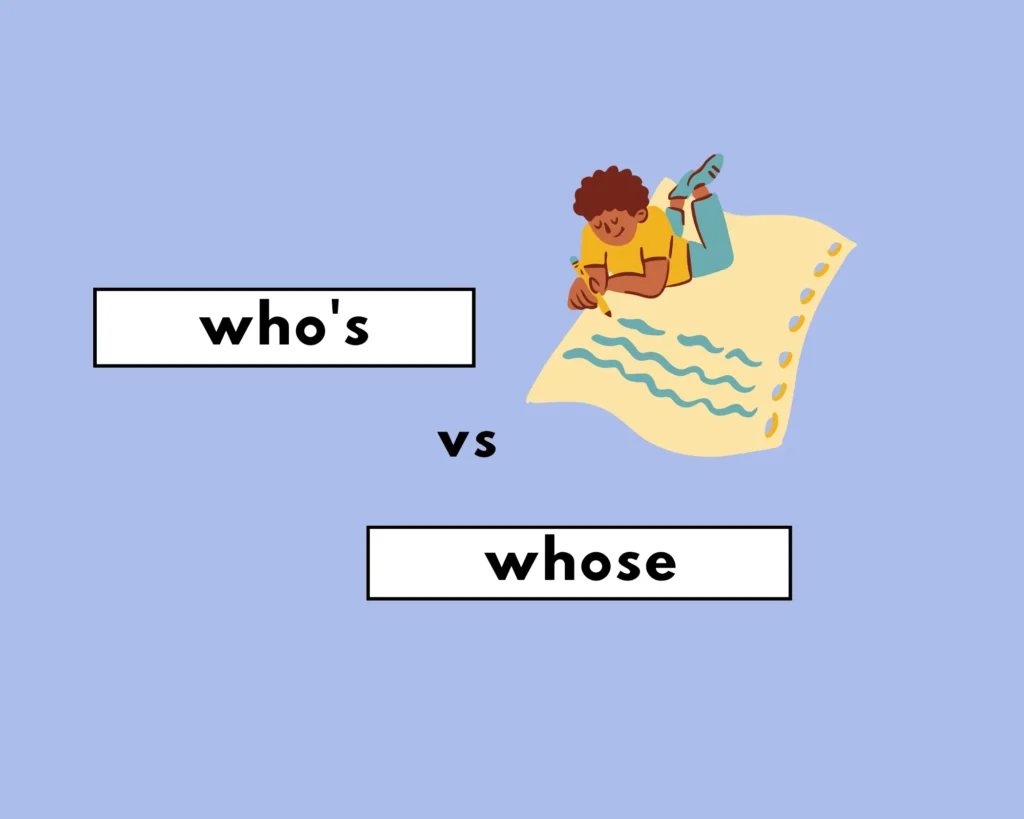Who’s vs. whose
If who’s vs. whose still gets you mixed up—don’t worry, the answer is a matter of a quick lesson in grammar.
“Who’s”and”whose”, explained
Whose and who’s are both forms of the interrogative pronoun “who“, (not the World Health Organization, though they have the same letters).
| word | example |
|---|---|
| Whose (possessive pronoun) indicates belonging | Do you know whose book this is? Whose car is parked in my spot? |
| Who’s (contraction, who + is or has) | Have you heard who’s going to be at the party? Who’s been to this restaurant before? |
The contraction “who’s” (who + is/has)
Who’s going to bring the dessert to the potluck this year?
Whose turn is it to do the dishes tonight?
I wonder who’s seen the new movie.
I wonder whose idea it was to paint the house purple.
Whose coming to the party tonight? (Incorrect: should be “Who’s”)
I don’t know who’s dog that is. (Incorrect: should be “whose”)
Who’s with an apostrophe ‘s’ is a contraction that combines the pronoun “who“with the present tense singular form of”to be“, namely is (in the third-person), and has, (third-person present sing. of have).
- [Who + is]: Who’s going to be at the party?; “Guess who’s coming to dinner?
- [Who + has]: Do you know who’s been here before?; she’s someone who’s always been there for me.
Apostrophe ‘s can indicate possession, (e.g., “Sarah’s jacket”). But an apostrophe ‘s can also be a short form (or contraction) of two individual words. This is how ‘s works in the word (read: contraction) “who’s“.
Keep in mind, when it comes to formal writing, try to avoid using most contractions because it can come across as informal. Apostrophes indicating possession are correct regardless of the tone or application of writing.
How to use whose (possessive)
Whose is the possessive form of who. We use whose to ask about possession or belonging; to specify something we’re referring to, or to provide more information on something or someone:
Whose phone is that on the table?
It’s the house whose door is painted red.
Jake, whose sister is an archeologist, is considering studying the subject as well.
If you can replace “who’s” with “who is” or “who has” and the sentence still makes sense, then “who’s” is the correct word to use. If not, you probably need “whose.”
Because “whose” is a possessive determiner, it doesn’t need an apostrophe ‘s to show possession since the noun is already made clear. The other possessive determiners are my, your, his, her, its, our, their, whose.
Also keep in mind that as a possessive pronoun, ‘whose‘ can refer to all types of nouns; e.g., people, places, things, and is not reserved for people only: China is a country whose history fascinates me.
Why do we confuse who’s and whose?
Who’s and whose are homophones in the English language, which are words that sound the same and are pronounced the same, but have different meanings, and should therefore be used distinctly from each other. This is true in the case of who’s and whose, despite both being rooted in the same subject pronoun who.
In review: who’s vs. whose

- Whose is the possessive form of who and asks about ownership or possession.
Work Sheet
According to the post, what does the contraction “who’s” stand for?
What does the word “whose” indicate?
According to the post, which word is the possessive form of “who”?
What study tip is suggested in the post to check if “who’s” is used correctly?
Which of these sentences is listed in the post as an example of a common mistake?
coming to the party tonight?
I don’t know dog that is.
turn is it to do the dishes?
I wonder seen the new movie.
Do you know book this is?
Frequently Asked Questions
What does “who’s” mean?
+
What does “whose” mean?
+
How do I check if “who’s” is correct?
+
Why no apostrophe in “whose”?
+
What are common errors?
+
Yash, D. "Whose vs. Who’s: What’s the Difference?." Grammarflex, Jun 14, 2025, https://www.grammarflex.com/whos-vs-whose-when-to-use-which-with-example-sentences/.
Sources
-
Oxford English Dictionary











